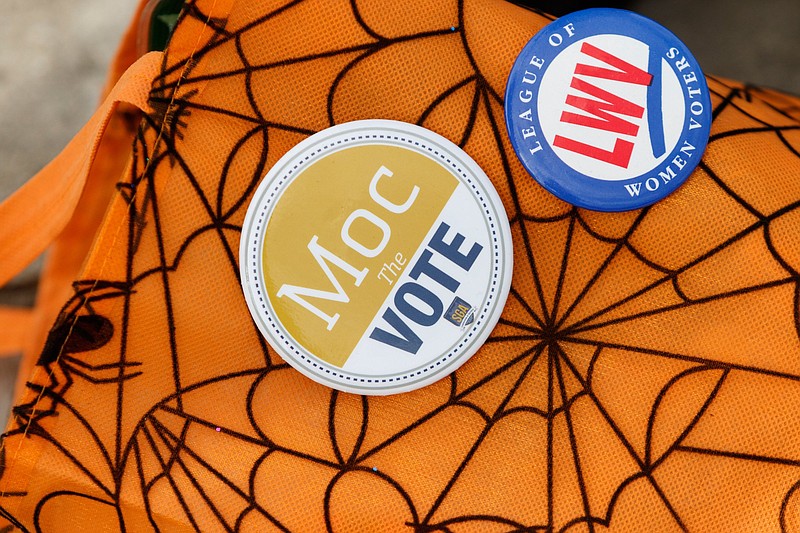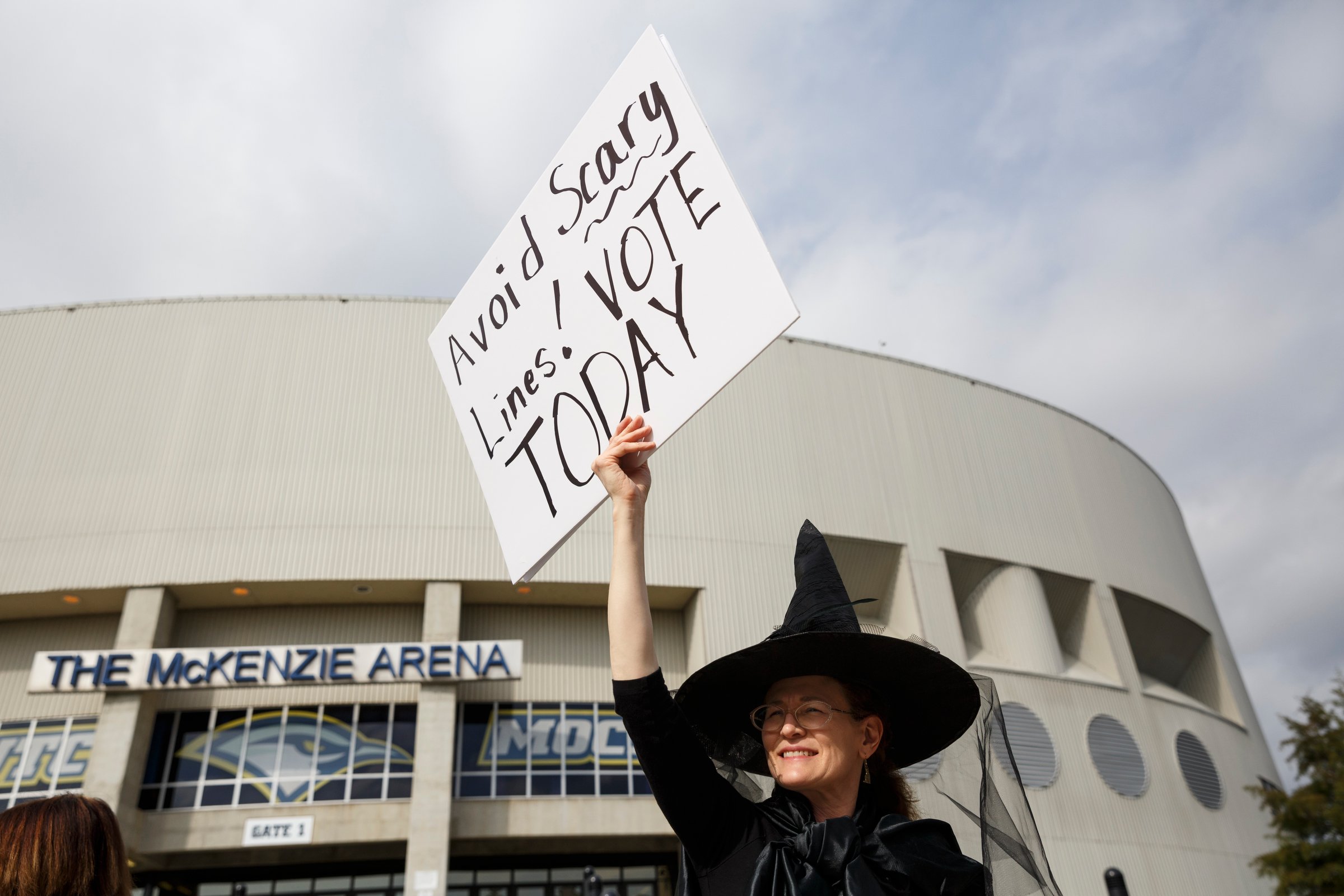GO MOCS VOTE 2018 INFO
> Two shuttles will be available to help UTC students get to the polls on Election Day. The shuttles will be available to take students to the Olivet Baptist Church and the Dogwood Manor polling stations while polls are open, 8 a.m. to 8 p.m.> A “Vote Together” party is from 4:30-7 p.m. on Tuesday, Nov. 6 on Chamberlain Field on UTC’s campus
CORRECTION: An earlier version of this story mistakenly identified Allison Cyrus as Allison Syrus. The story also referenced data collected on student voter participation from the 2010 midterm elections. The data that Amanda Wintersieck referenced was collected from the 2016 elections.
With midterm elections three days away, community organizations - and candidates - are hoping their efforts to activate an underrepresented groups of voters worked this year. Luckily, national trends already show that young voters, typically aged 18 to 24, are more likely to vote in the 2018 midterm elections than in years past.
A survey by the Education Week Research Center of 18- and 19-year-olds, 66 percent of whom have never voted in an election before, found that 63 percent planned to vote in the midterms.
Participants said they mainly planned to vote because they think it is good for the country, it is their civic duty or they were influenced to vote by their views (both positive and negative) of President Donald Trump's administration, said Holly Yettick, director of the Education Week Research Center.
These motivations to vote are exactly what some local organizations, including the League of Women Voters and the University of Tennessee at Chattanooga (UTC) have been working to engage throughout the election cycle.
"For the last 20 years, we've been studying get-out-the-vote efforts and mobilization efforts," said Amanda Wintersieck, a political science professor at UTC. "The scientific literature is clear, if you can give people a psychological attachment to their democracy, then that increases engagement, so the way we are trying to increase the psychological attachment is this idea of vot[ing] together, so let's go as a group and elevate our citizenship."
Despite decades of movements like Rock the Vote and Get-Out-The-Vote, that are aimed at increasing youth turnout, Wintersieck said that in the 2016 midterms only about 70 percent of UTC students were registered to vote. Even fewer actually voted - only 40.6 percent.
"This is interesting, because it was 10 percent less than the national average, and we are also below our peer institutions," she said.
Allison Cyrus, a senior at UTC said she thinks many younger voters don't believe their vote actually matters.
"I see a culture of non-involvement, this apathetic attitude that it doesn't really matter," Cyrus said. "I do think they misunderstand the notion of elections."
Nationally, young voters who don't plan to vote often cite not knowing how to register or how to vote, where to register or being informed about the candidates as reasons they don't vote.
Since Hamilton County's August general election, 9,339 people have registered to vote, with 3,542 of them, or 37.9 percent, being aged 18 to 24.
The local chapter of the League of Women Voters, a nonpartisan organization aimed at encouraging voting and civic engagement, has been working steadily to increase awareness among young voters in Hamilton County.
For the duration of early voting, Maria Sabin, the local chapter's secretary, stood outside the McKenzie Arena on UTC's campus, directing students to early voting locations or educating them on voting in general.
"I've had so many tell me, "Oh, I can vote early?" Sabin said. "They're such a huge population [in Hamilton County]. Our primary mission is to encourage the entire community to participate in politics and in the election process."
Young people who did indicate they were planning to or had already voted, were more likely to be suburban, identify as liberal, have attended a private high school and were engaged in civic-related activities, according to the Education Week Research Center's report. Many also cited school shootings as a top concern - a topic that gained traction locally this spring, when students walked out of schools and called for gun control reform after the Valentine's Day shooting at a high school in Parkland, Florida.
However, the topic of gun violence has not seemed to drive young voters in the Chattanooga area to the polls.
Some faculty members at UTC have been studying voter participation and have led a variety of initiatives this year to increase engagement, Wintersieck said.
"Given the highly partisan nature of politics, we feel strongly that we need to demonstrate good democratic norms in a non-partisan way," she said.
Voter registration drives, offering transportation on primary days, and the 'Exercise Your Right' initiative these past weeks have been among them. On Election Day, UTC is hosting the Mocs Go Vote 2018 event for students, as well as providing two rented vans to help transport students to the polls.
"I think a lot of people genuinely believe their vote doesn't matter," said Camden Eckler, a junior at UTC and a member of the Student Government Association. "Its hard for me to sympathize with people who say, 'Oh, I don't have time For the people who say their vote doesn't count, it's because they aren't going out and voting."
As SGA's Government and External Affairs Committee chairwoman, Eckler has been involved in creating the initiatives to increase voter turnout. She has worked with a faculty committee also devoted to increasing participation among UTC students. She said her motivation to increase the amount of young voters is personal.
"During the presidential elections in 2016, I wasn't old enough to vote yet, but I remember people complaining and then not going out to vote ," she said. "I think voting is one of the most powerful ways that you can protest. Just go vote."
SGA declined to comment officially on the organization's voter turnout initiatives.
Mayor Andy Berke and the Mayor's Youth Council also held a forum earlier this fall focusing on ways to get more young people involved in the election process, including events and initiatives that high school students could host in local schools.
On Aug. 29, they hosted Jason Kander of Let America Vote, who, along with Berke and local attorney Chantelle Roberson, judged the Mayor's Youth Council members and their ideas such as holding voting festivals, mock votes and inviting candidate into local schools.
In Hamilton County, where voter turnout is historically low - only 29 percent of registered voters voted in the August election - it remains to be seen how many of the county's 206,945 registered voters will have turned out by Tuesday and if young people will have shown up in higher numbers than in years past.
Contact staff writer Meghan Mangrum at mmangrum@timesfreepress.com or 423-757-6592. Follow her on Twitter @memangrum.

